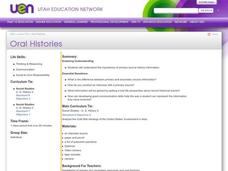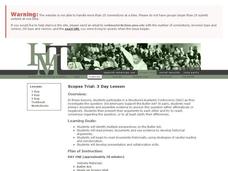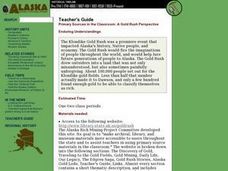C-SPAN
Primary and Secondary Sources: Trailblazers in Congress
Trailblazers forge the path into uncharted territory, they establish a precedent for others to follow. Young historians research trailblazers in Congress using primary and secondary sources to profile outliers that changed the face of...
Curated OER
Teacher Appreciation Week (Elementary)
Primary writers will create a persuasive essay about Teacher Appreciation Week. Additionally, they will select a quote from a famous person and write a persuasive essay about how it relates to one of their favorite teachers. In the end,...
Historical Thinking Matters
Rosa Parks: 5 Day Lesson
What led to the success of the Montgomery Bus Boycott, and how might historians approach this question differently? This rich series of lessons includes a short introductory video clip, analysis of six primary source documents, and...
National Endowment for the Humanities
Using Historic Digital Newspapers for National History Day
Your learners will take a trip through history as they peruse through historic digitalized newspapers, reading real articles from such historical periods in the United States as the Temperance movement and passage of the Thirteenth...
Historical Thinking Matters
Social Security: 5 Day Lesson
Did the New Deal fundamentally shift the role of the American government in the economy? Your class members will examine the interpretations of various historians in answering this question, and use a variety of primary and secondary...
Curated OER
Oral Histories
Distinguish the difference between primary and secondary sources. High schoolers discover how to conduct an interview using an individual as a primary source, and why it is important to get a real-life perspective. They either video or...
Civil War Trust
Transcribing Civil War History
Primary sources are valuable for understanding the context of historical events, but the diction and dialect in these documents can be difficult to understand. Middle and high schoolers participation in a transcription process in which...
Curated OER
Whose History Is It Anyway? Patterns in History
Read and examine primary source material in order to analyze, synthesize, and debate information about the Great Depression. Critical analysts research various source materials related to the Great Depression. They work in teams to...
Urbana School District
Knocking Down Fences
After reading The Other Side and guiding children through a picture walk, third graders investigate evidence of the civil rights movement. In the mini unit, 3rd graders analyze photographs of the past and make connections between...
Historical Thinking Matters
Scopes Trial: 3 Day Lesson
Was the Scopes trial more complicated than a simple debate between evolutionists and creationists? As part of a structured academic controversy (SAC) activity, pupils consider multiple perspectives of the Butler Act and engage in close...
Curated OER
Using Primary Documents: "Agreeable to His Genius"
Students use primary sources to reconstruct events in the life of John Partidge Bull.
Curated OER
The Korean War
Students examine the implications of the Korean War. In this Korean War lesson, students access the Korean War website to gain access to veterans of the war that they may interview. Students conduct interviews with veterans and create...
Curated OER
Introduction of Primary Sources
First graders create two personal artifacts to add to a primary source shoebox that represents information about themselves. The first draw a self-portrait then build an artifact from Play-Doh and pipe cleaners to represent something...
Curated OER
Slave Narratives: Constructing U.S. History Through Analyzing Primary Sources
Learners access oral histories that contain slave narratives from the Library of Congress. They describe the lives of former slaves, sample varied individual experiences and make generalizations about their research in journal entries.
Historical Thinking Matters
Rosa Parks: 3 Day Lesson
How can evidence and perspective challenge even the most well-known of stories? Through primary and secondary source analysis, think-alouds, and discussion, young historians evaluate the historical narrative of Rosa Parks across multiple...
West Virginia Department of Education
History Scene Investigators - John Brown's Raid
An informative resource covers the event of John Brown's Raid, an event that became an important part of West Virginia history. It serves as a standalone and covers the event and John Brown's life in depth using group work, online...
Curated OER
Introduction of Primary Sources: Introduction to TDC site (Lesson 3)
First graders are introduced to using a database as a primary source. Using the internet, they choose a site of artifacts and practice navigating through the site. They identify an artifact and draw them on a large piece of white...
Curated OER
Class Celebration of Primary Sources (Lesson 6)
First graders participate in a celebration to end their examination on primary sources. In teams, they guide special guests around their classroom to show what they have done with primary sources. They share their peronal primary...
Elizabeth Murray Project
The Education of Women in Colonial America
What educational opportunities were available to women during the colonial era in American history? How did the opportunities available to women differ from those for men? To answer this question, class members examine a series of...
NET Foundation for Television
1850-1874 Notable Nebraskan: J. Sterling Morton
What are the characteristics of an outstanding citizen? Nebraskan J. Sterling Morton contributed to the formation of societal and family values in his state. Learners gather information on Morton's life accomplishments from primary...
Curated OER
"Pray, Why Speakest Thou Thusly?"
Examine popular language and slang and how they have changed over the course of American history. Conduct Internet research, use an online interactive Colonial House website to translate 17th century language into 21st century language,...
Curated OER
Examining the Spanish Flu of 1918
Eighth graders take a closer look at the Spanish influenza breakout of 1918. In this research skills lesson, 8th graders examine primary sources gathered by their instructor and identify how communities prepared (or did not prepare for)...
Curated OER
Primary Sources in the Classroom: A Gold Rush Perspective
Students develop and hone their historical inquiry and analytical abilities. They draw up a list of 20 essential items they would have to bring to survive one year as a Gold Rush stampeder.
Historical Thinking Matters
Rosa Parks: 1 Day Lesson
You've heard of the historical moment when Rosa Parks refused to give up her seat on a bus, but did you know that some historical accounts disagree on where she sat? Investigate this query with your young historians, and practice...

























